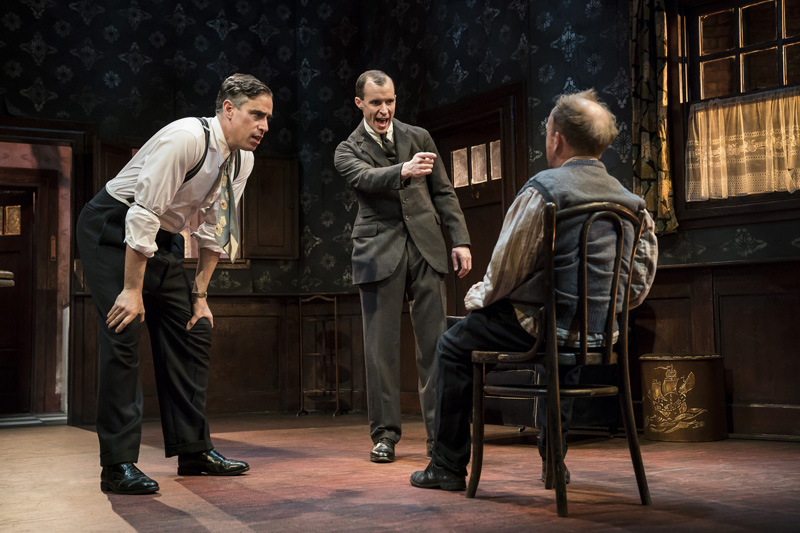“The Birthday Party”, Harold Pinter Theatre
John Russell Taylor in the West End
18 January 2018
In 1958 when The Birthday Party was first performed, apparently nobody “understood” it, except maybe Harold Hobson in The Sunday Times: at least he gave it a favourable review, thereby putting himself in the same sort of relationship with Harold Pinter that Kenneth Tynan a couple of years earlier had established with John Osborne.

Stephen Mangan, Tom Vaughan-Lawlor and Toby Jones.
Photo credit: Johan Persson.
Even at the time l could never really see what there was to “understand”. The Birthday Party is a story that is told, and if you do not find it interesting and entertaining as such then it hardly matters whether it carries a message about life or is crammed with symbolism that stands for some esoteric doctrine. Quite possibly Noël Coward’s plays, which Pinter admired, have more message, while its mysteries are hardly more complex or intense than those in Murder on the Orient Express: the only difference is that there is no Hercule Poirot to stand up at the end and say it all came about because of this, this, and this.
So what does happen in The Birthday Party? Well, there’s this guy, Stanley Webber, who is living a relatively pampered life in what is clearly a sub-standard seaside B&B, where he seems to be a sort of adopted child-figure. That is, till two men turn up without explanation to stay overnight; it’s Stanley’s birthday. They seem to have it in for Stanley, though we never find out exactly why. One of them, Dermot McCann, is presented as a fanatical Irish Catholic and the other, Nat Goldberg, as a mother-loving Jewish businessman.
It’s not as though we are given too few clues: the problem, in fact, is that we are given too many diverse ones. Alternating cross-questions are set to wear Stanley down: McCann’s are about religion and politics, Goldberg’s about sex and business. Whether he has done anything, something, or nothing wrong Stanley is soon reduced to gibbering lunacy, replaced the next morning by an almost catatonic silence. It’s a bit like the feeling of indefinable guilt when going through customs at an airport, even if we know perfectly well that our bags contain nothing even marginally illegal.

The ensemble.
Photo credit: Johan Persson.
Perhaps that is Stanley’s predicament, perhaps not. And if he were here we still should not expect Pinter himself to be able to tell us. l remember Harold once telling me that he had just received a letter from someone who claimed to have solved the riddle of The Caretaker: the three characters are God the Father, God the Son, and God the Holy Ghost, the shed Aston is building in the garden is Christ’s Church on Earth, and so on. How did Harold feel about that? I asked. “The most I would say is that it is not something I consciously had in mind.” As when Gertrude Stein was dying in Paris and murmured, “What is the answer?” and then, when answer came there none, added, “Well then, what is the question?” and died.
And how does the play itself stand up, sixty years after? Pretty well, I would say. It clearly does not have the exquisite polish of Pinter’s later work, but his ear for the way people really speak is as sharp as ever. I was just reminded of one thing, though. Once I was saying to him, apropos of his screenplay for the film version of The Caretaker, that I could not detect spots where he had pared down the text. He said it was perfectly simple; the problem with the three-act play was that the two climaxes required by classic ideas of dramatic structure had to come too far apart if the three acts were to be of roughly equal length, so you could always cut about half of Act Three and no one would notice. Sure enough, there are bits of Act Three here that look like padding, noticeable after the ferocious tightness of Acts One and Two.
Apart from the question of “understanding”, the other thing that puzzled me at the time of the play’s first production was that audiences seemed impervious to how funny a lot of it was: when Irving Wardle coined the term “Comedy of Menace”, he meant the emphasis to be as much on the comedy as on the menace. This time audiences are in no doubt about the humour. And it must be said that Ian Rickson’s production maintains the delicate balance immaculately.
Nor does any member of the cast let him down. In a pitch-perfect ensemble, those who most strikingly capture the full Pinter flavour are, perhaps inevitably, Zoë Wanamaker as Meg, the shabby-genteel mistress of the house, and Toby Jones, physically and vocally perfect as the unfortunate Stanley. Stephen Mangan as Goldberg also deserves special mention for not parodying or exaggerating the character’s Jewishness: more like Tevye than Fagin. And it was sheer genius to get the Quay Brothers to design the set: their characteristic blend of the sinister and the humdrum exactly parallels Pinter’s own. I think Pinter would have been proud of his latest advocates.









